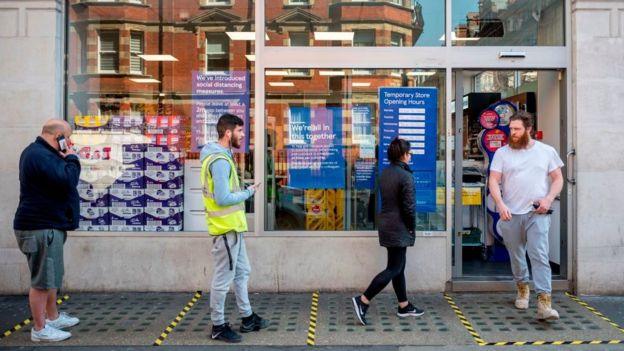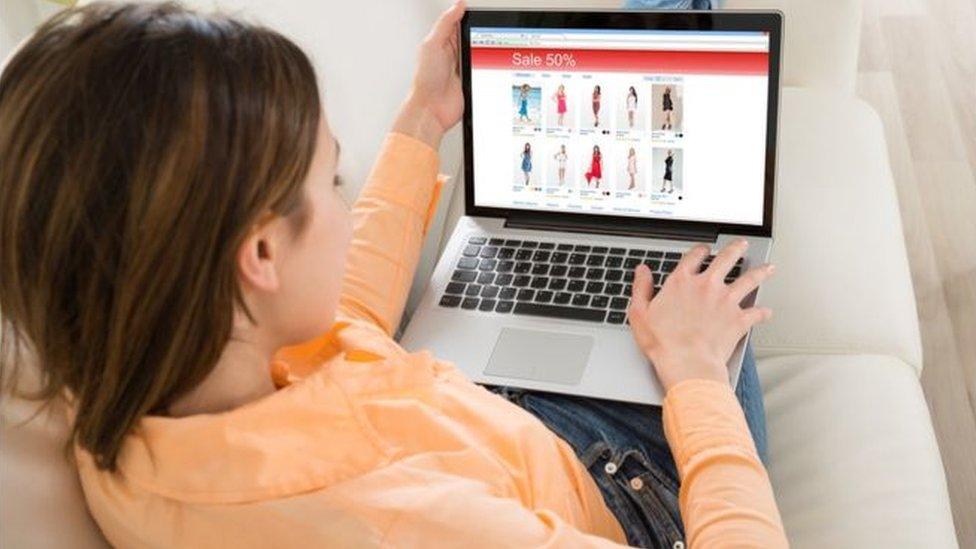Coronavirus: Are you being served, safely?
- Published

Grocery shopping is going online rapidly. New data shows retailers with convenience stores have picked up a lot of the additional spend in person.
Without bars and restaurants, off-sales are sharply up, and so is frozen food.
The future of non-food shopping In Scotland lacks company or the personal touch, and could feature more queuing, making appointments, and restricted ability to try on clothes or shoes.
The nation's shopping basket has changed, and the shopping experience is about to change a lot more.
We've got data published today showing that online grocery sales doubled in the month from mid-April to mid-May, when compared with the same period last year.
If more slots had been available, it might have been more than the 13% of grocery spend that new figure represented. But the addition of delivery slots was no mean logistical feat for the retailers, when they were preparing for 6% per annum growth to slow down over the next few years.
The Britain-wide figures, from the Nielsen data company, show the number of households buying their groceries online was up from 4.8m to 7.9m.
Spending in shops was up, too, but by 7%. A lot of that reflects the inability to spend money in restaurants or bars.
So off-sales of alcohol were up 32% and frozen food was up 31%. Health and beauty fell 19%.

Customers are becoming more used to queuing outside shops
The big gainers among the major retailers was led by Iceland, with sales up 24%, and the Co-op doing well with lots of local stores. That convenience store option also explains why Tesco put on sales by 12%, while Asda, without small format shops, rose at only half that rate.
Marks & Spencer was up 3%, but having much of its food sold in railway stations, petrol stations and motorway services, there wasn't much footfall.
An orderly queue
In all these cases, we're already used to having to queue to get in, with numbers in each store limited, and then being steered round shops with a lot of signage to tell us to keep our distance. Till staff are behind screens, and you're encouraged to go cashless.
Such measures are being extended to the experience in non-food shops, when they are eventually allowed to open in Scotland. That's due to happen on 15 June in England, but there's still no date for Scotland, beyond the imminent reopening of garden centres.
The Scottish government published guidelines on Tuesday on what to expect and how to prepare when the time comes, both for retailers and for shoppers. Retail was the first of "around 14" sector guidelines being published, along with manufacturing. Construction is soon to follow.

People are being advised to use online ordering and home delivery when possible
They address additional considerations for non-grocery shopping. If you're going to a shopping centre, numbers will be limited in the centre as well as individual outlets inside it, so there could be queues at both, and the shopping centre management is being told to manage queuing for both.
Some shops may choose to issue numbered tickets for you to visit, or to book appointments. Those bookings won't be for a make-up demonstration or beauty treatment, because they won't be allowed for the foreseeable future.
In bigger shops, where where it's possible, exits and entrances may be designated to move people through a shop and reduce so-called pinch-points. And if it's too busy, you're advised to come back later.
There will be lots more cleaning, particularly where customers and staff are touching, say, hand rails.
Lifts, as in elevators, will be only for essential use.
Staggered
If clothes or shoes are tried on, they're to be put aside, separate from other stock. Likewise for returned items. You won't be shopping with anyone else for advice or reassurance, so you're going to have to decide if those shoes are right for you or not.
And, in general, you're advised to shop as little as possible, to use online ordering and home delivery where and when you can - to plan your shop, with a list, so that you get what you need to last a while, and limit the number of trips.
Also, wear a face covering, but you'll have to remove it if asked for proof of age.
Much of the advice is for employers to safeguard their staff, with advice to stagger shifts so that workers don't all arrive and leave at once. Likewise for taking breaks, with some time in the fresh air recommended.
There's a strong emphasis across the retail and manufacturing guidelines on working with staff and trade unions, to get consent and buy-in for changes being introduced.
And there's enforcement. The Health and Safety Executive, local authorities and Police Scotland have signed up to a joint approach to ensuring the rules are observed, using new powers for the long arm of the law to reach into the workplace as never before.

EASY STEPS: What can I do?
CONTAINMENT: What it means to self-isolate
MAPS AND CHARTS: Visual guide to the outbreak
VIDEO: The 20-second hand wash

